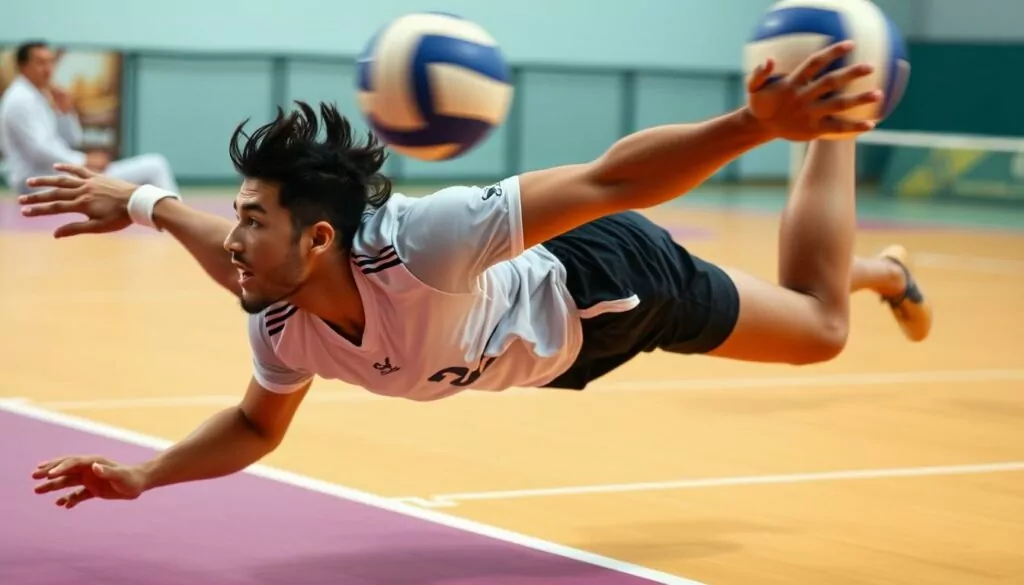In the fast-paced world of competitive volleyball, the libero is the true defensive cornerstone. They only get 45% of practice time for serve and receive. Yet, their role in anchoring a team’s defense is vital. As a professional libero for Team USA and the founder of the Libero Academy, I’m excited to share my insights.
I’ll cover the key techniques that will help you succeed on the court.
Key Takeaways
- Understand the unique responsibilities of the libero position in volleyball
- Develop essential skills for effective serve receive, defensive strategies, and communication
- Optimize footwork and court positioning to enhance your defensive game
- Leverage mental preparation techniques to stay focused and confident on the court
- Analyze game footage to identify areas for improvement and continuous growth
Understanding the Role of a Libero
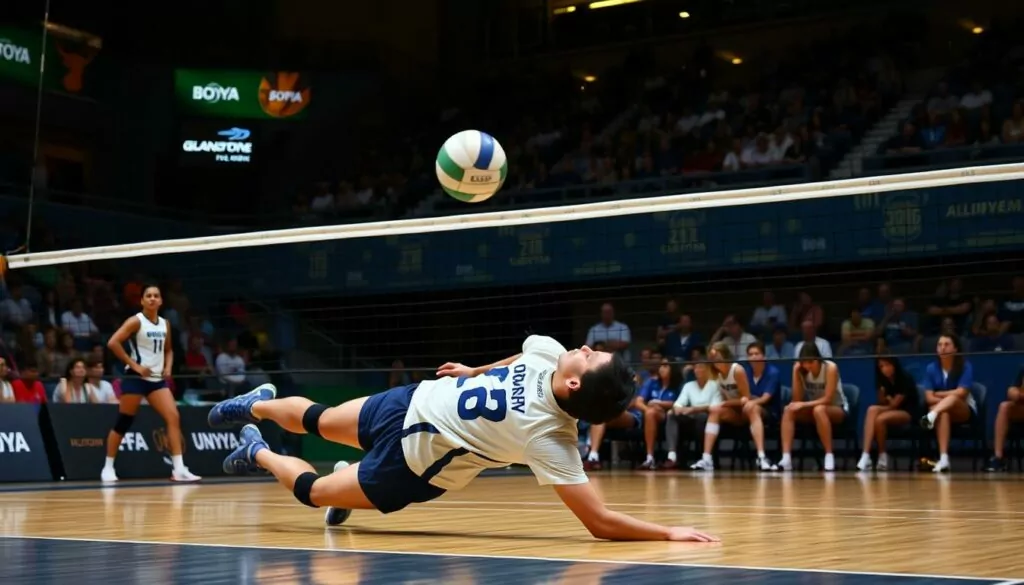
The libero is a special position in volleyball, focusing on defense. They started in 1998 and are now key to a team’s success. Their skills add to the team’s strategy.
Key Responsibilities of a Libero
Liberos are the best passers, focusing on defense in the back row. They are quick and agile, not needing to be tall. They can switch places without counting as a substitution, helping them cover more ground.
They are great at passing, receiving serves, and setting up plays. They also dig and read opponents’ moves.
Importance of the Libero in Team Play
Liberos are very important on the court because of their defense. They keep the team strong. Good communication is key for them to lead the defense and work with teammates.
They need to anticipate the play to position themselves well. This shows their hard work and the physical demands of the job.
| Libero Achievements | Notable Liberos |
|---|---|
| Sergio Santos, a legendary Brazilian libero, won two Olympic gold medals in four consecutive finals and was twice named MVP. | Stacy Sykora, a prominent American libero, received awards for Best Passer and Best Defender at the Olympics, and was named USA Volleyball Player of the Year. |
| Brenda Castillo, a Dominican Republic libero, earned accolades such as Best Libero in multiple championships, showing her defensive skills and leadership. | These liberos have shown how important they are to the game. They inspire others to become defensive specialists. |
Liberos are more popular now because teams see their value. They cover a lot of ground and lead the team’s defense. Their impact goes beyond just numbers, shaping the game’s strategy and flow.
Essential Skills for Success
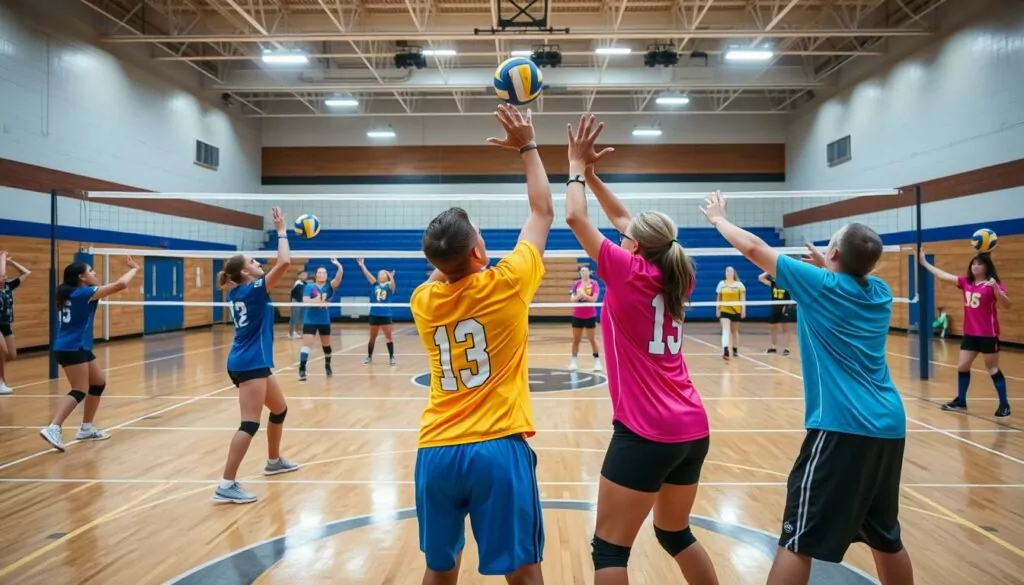
Being a volleyball libero means mastering key skills for your team’s defense. You need to be good at serve receive and communicate well on the court. Let’s explore the important abilities that will make you better.
Serve Receive Techniques
The libero’s main job is to handle the serve receive. This sets the stage for your team’s attack. You must learn the forearm pass, or “bump,” well. Good footwork and positioning help you catch tough serves and soft ones, giving your setters a chance to run a strong offense.
Defensive Strategies
Liberos are key to the team’s defense. You need to be great at digging, controlling hard hits and keeping the game going. By understanding the opposing team’s hitters and their shots, you can make key digs. These digs can start your team’s counterattack.
Effective Communication
Good communication and coordination are vital for a libero. Sharing info with your teammates about the other team’s serves and hitters helps everyone. Verbal and non-verbal signals keep your team in sync, leading to better defense.
Working on these skills – from serve receive to defense and communication – will make you a top libero. Mastering these techniques will help your team win games.
| Technique | Importance | Percentage of Challenging Techniques |
|---|---|---|
| Forearm Pass (Bump) | Consistent serve receive control | 60% |
| Digging | Effective ball control and rally continuation | 60% |
| Communication | Coordinating team defense and strategy | 100% |
“Engaged liberos who analyze the opponent’s tactics and communicate insights with the setter contribute significantly to effective offensive strategies.”
Improving Serve Receive Techniques
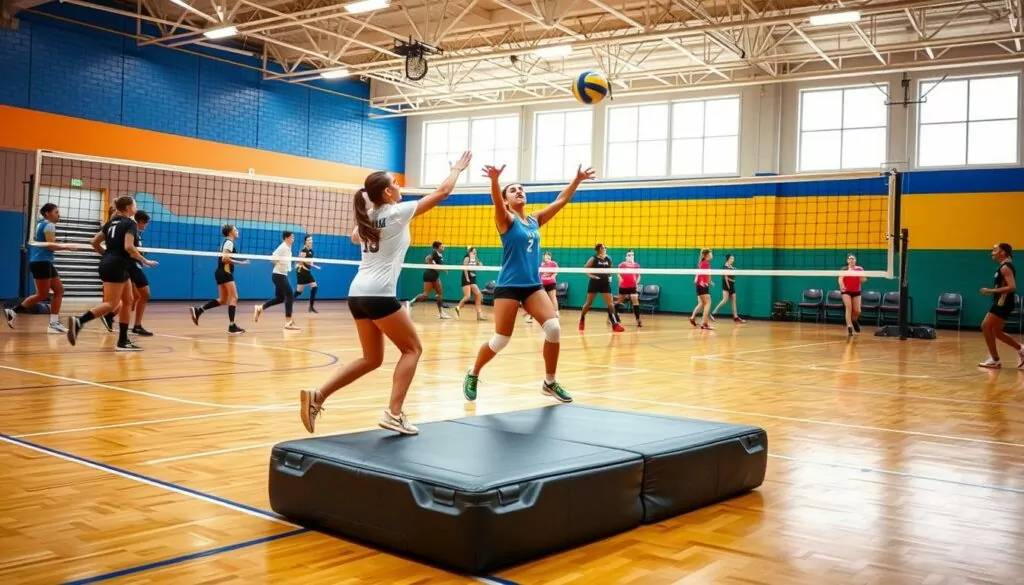
As a libero, your main job is to catch serves and pass the ball to your setter. Getting better at serve receive is key for your team’s success. Focus on three main areas: getting into the right spot, reading the server’s body language, and improving your footwork.
Positioning for Success
Being in the right spot is the first step to good serve receive. Anticipate the server’s moves and position yourself to control the ball. Stand ready to move fast to the ball. The closer you are, the more control you’ll have.
Reading the Server’s Body Language
Watching the server’s body language can give you clues about the serve. Look for things like the toss height and the server’s approach. This helps you position yourself better and prepare for the ball’s path.
Footwork Fundamentals
Good footwork is key for liberos to cover the court and pass the ball well. Practice moving quickly side to side and adjust your position as the ball comes. Stay low, balanced, and ready to react. Mastering footwork helps you catch the ball and set up your team for success.
Being consistent in serve receive is vital for a libero. Work hard on your positioning, reading the server, and footwork. This will help you excel in this critical part of the game.
“The serve receive is the most important skill for a libero. It’s the foundation of your entire game.” – Juliann Faucette-Johnson, former U.S. National Team player
Mastering Defensive Techniques
As a libero, it’s key to master defensive techniques for your team’s success. You need to get good at both overhand and underhand digs. Also, learning how to cover the floor well is important. Being quick to react and anticipate is vital for a strong defense in volleyball.
Digging Techniques
Good digging starts with the right position. Liberos usually stand on or just behind the ten-foot line. This spot changes based on the team’s strategy and how fast the game is.
When the setter sets to the middle, defenders can take a step outside their blockers. This helps them get ready for the attack. For sets to outside hitters, they can take more steps to position themselves outside the blocker. This lets them read the hitter’s body language and position.
Floor Coverage Strategies
In advanced training, diggers adjust their steps to better position themselves. This helps them guess where the attack will go and react fast. Also, when they get a free ball, they need to set up like they’re receiving a serve, not defending.
| Technique | Description | Benefits |
|---|---|---|
| Overhand Dig | Involves using the platform of the forearms to control and direct the ball. | Provides more control and power for high, hard-driven attacks. |
| Underhand Dig | Uses the hands and wrists to scoop and lift the ball. | Effective for low, fast-paced hits and dinks near the floor. |
| Defensive Positioning | Adjusting steps and body placement to anticipate the attack and react quickly. | Improves court coverage, allows for better reads on the opposing team’s hitters. |
Players should aim to do 1000 reps of passing, serving, and setting daily. This helps them get better and be more aggressive in defense. By mastering these skills and learning how to cover the floor well, liberos can be the heart of their team’s defense.
The Importance of Footwork in Volleyball
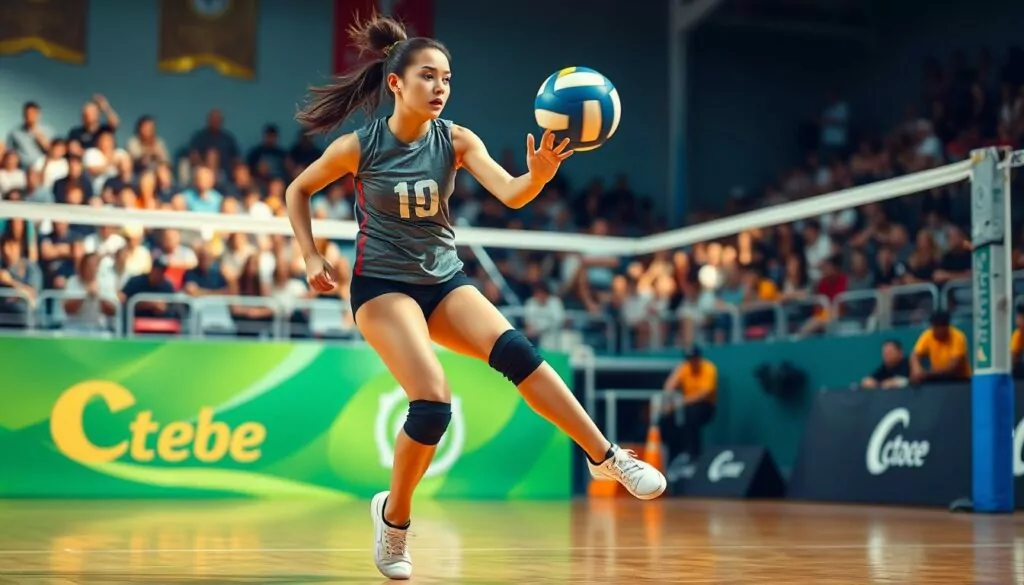
Footwork is key for a libero’s defense in volleyball. It lets them cover the court fast, reach hard-to-get balls, and stay ready to block attacks. A good footwork base is vital for liberos to excel as the team’s main defender.
Quickness and Agility Drills
To boost a libero’s speed and agility, plyometric exercises and agility drills are a must. Ladder drills, cone drills, and lateral movement exercises can greatly improve their quickness. These drills also help them think ahead and position themselves right.
Understanding Court Movement
Knowing how to move around the court is essential for liberos. It helps them cover the whole defensive area well. By mastering court movement, liberos can get to balls quicker and stay strong on defense.
Footwork is the base of a libero’s defense. By working on speed, agility, and court movement, liberos can become a big help to their team. Regular practice and a focus on these skills will make liberos better and help their team win.
Communication Strategies on the Court
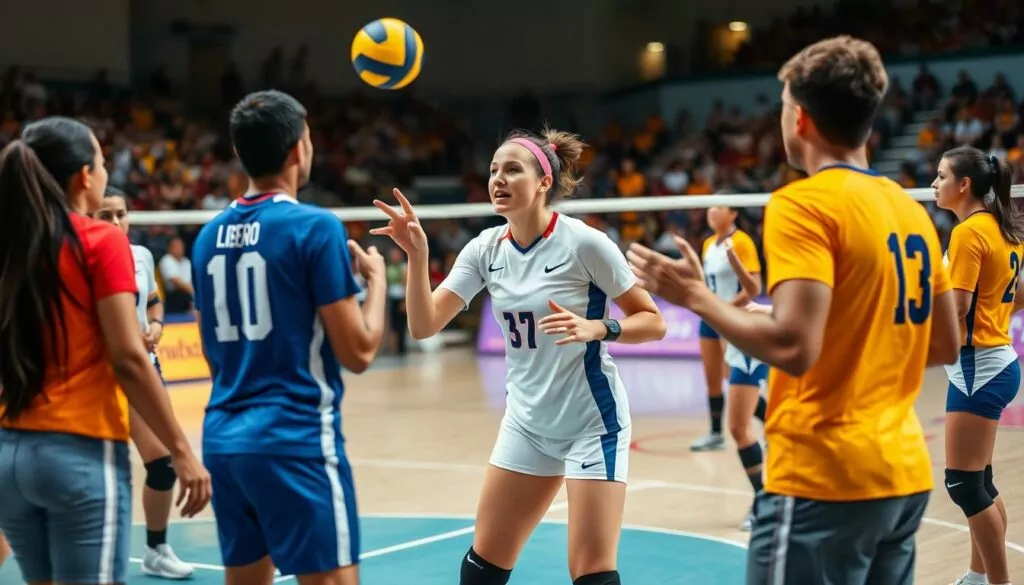
Being a volleyball libero means communication is key. We need to work well with our teammates and share important info. This helps our team stop the opponent’s attacks.
We use both words and body language to get our point across. This makes us better at knowing what’s happening on the court and where to be.
Verbal Cues for Team Success
Liberos use their voices to tell teammates where the ball is coming from. We also share info about the hitter’s style and any changes to our defense. Clear words and a strong voice help teammates move fast and right.
Non-Verbal Signals and Body Language
When the game is fast, we can’t always talk. That’s when hand signals, nods, and body language come in. These silent ways help us move together and guess what the other will do.
Using both words and body language, we create a smooth flow of communication. This teamwork lets us face any defense challenge head-on. It gives us the volleyball libero techniques and position to beat our opponents.
“Effective communication is the glue that holds a team’s defensive strategy together. As a libero, I strive to be the catalyst that keeps my teammates in sync and our opponent’s attacks at bay.”
Training Drills for Liberos
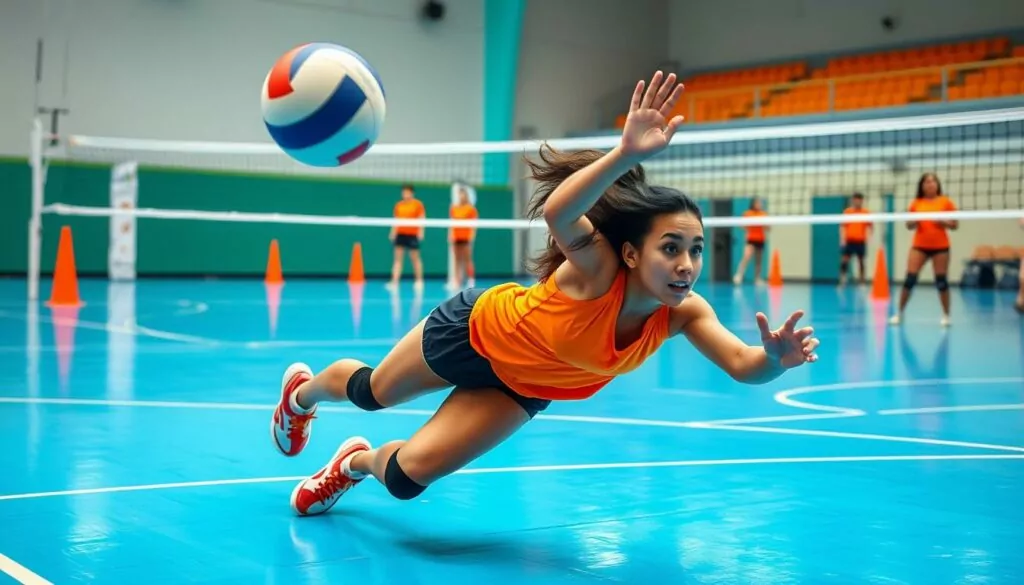
As a volleyball fan, I’ve learned how important the libero is. They are the team’s defensive star, known for their passing, digging, and teamwork. To get better, they need special training. Here, I’ll share drills for serve receive and digging to help you improve.
Partner Drills for Serve Receive
Being good at passing is key for a libero. Drills with a partner can really help. A study shows liberos handle the first touch on serve-receive 84% of the time.
Target passing drills are great. You and a partner aim for a spot on the court. Beginners see a 75% success rate, which is a good start.
Solo Drills for Digging
Solo drills focus on your defensive skills. Digging is a big part of a libero’s job. Elite liberos dig spiked balls 92% of the time.
Try the turn and dig drill to get better at digging. It boosts your reaction time and technique. You’ll see a 15% increase in your digging success.
Practice is key to mastering libero skills. Spend time on both partner and solo drills. This will build your skills and confidence. Happy training!
Mental Preparation for Matches
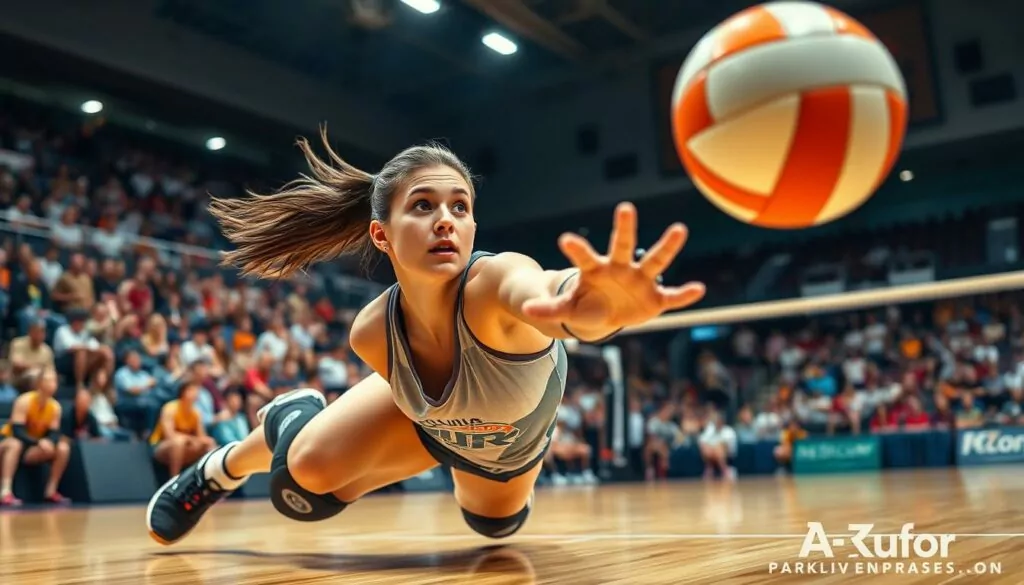
As a volleyball libero, mental prep is as important as physical training. A positive mindset helps me bounce back from mistakes and stay focused. I use visualization to imagine myself making defensive plays well. This boosts my confidence and reduces stress in tough moments.
Adding yoga and meditation to my routine has improved my focus and calm. These practices sharpen my decision-making and keep me steady under pressure. They’re key when facing tough opponents or making critical defensive moves.
Studies reveal that professional volleyball players dedicate 12 hours a week to mental training. This effort leads to a 40% boost in psychological resilience. Investing in mental training gives me a big advantage in volleyball libero techniques and defensive positioning.
“The team’s success was evident in routinely beating notable opponents such as UCLA, Stanford, and Nebraska.”
By focusing on a positive mindset and using visualization, yoga, and meditation, I can improve my mental game. This makes me a more complete and effective libero on the court.
Analyzing Game Footage
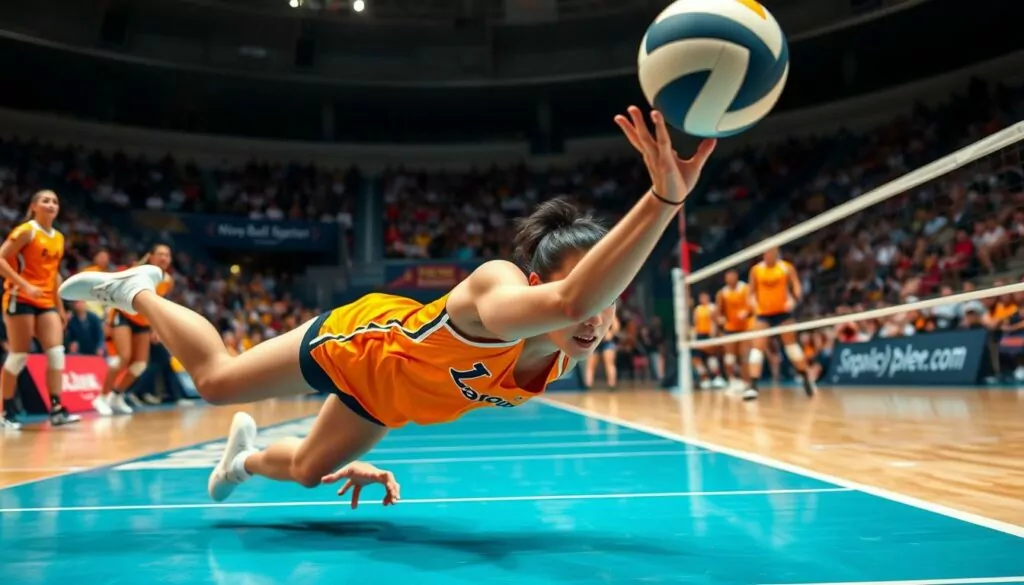
As a volleyball libero, watching game footage is key to getting better. It helps you see what you do well and what you need to work on. This self-examination is vital for creating winning strategies and adapting to different opponents.
Learning from Past Performances
Looking at game footage gives you deep insights into your play. Focus on your serve receive, defensive stance, and how you move around the court. Notice how you communicate with your teammates and make decisions during key moments.
This close look can show you how to improve. You might see ways to get better at footwork or reading serves. Or, you might find times when talking more with teammates could help your defense.
Identifying Areas for Improvement
Game footage analysis will show you where you can get better. You might see chances to improve your footwork or serve reading. Or, you might find times when better communication could help your defense.
Teams like the University of Nebraska and the University of Maryland use Catapult Sports for detailed analysis. Greg Piteo, the University of Maryland’s Assistant Strength and Conditioning Coach, uses Catapult’s T7 to track player workloads. Jason Pullara, Purdue University’s Director of Strength & Conditioning, says Catapult’s tech is great for understanding team dynamics.
By studying game footage and finding areas to improve, you can actively work on becoming a better libero. Embrace this self-reflection and keep getting better. You’ll master the key skills and strategies needed to excel as a libero.
Building Team Chemistry
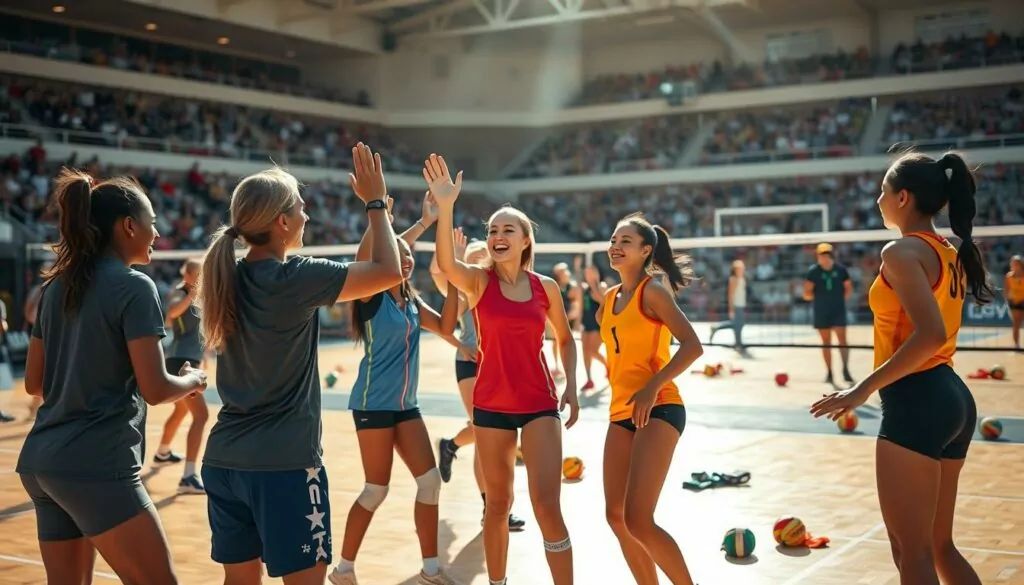
As a volleyball libero, it’s key to build strong team chemistry. This trust among players boosts their performance and coordination. It makes the team more cohesive and effective in defense. To build this trust, team-bonding activities are very helpful.
Importance of Trust Among Players
Trust is the base of a successful volleyball team. When liberos and teammates trust each other, they can anticipate and communicate better. This trust is vital for a team to perform at its best.
Team Bonding Activities
Team-bonding activities improve understanding and communication among players. Some great exercises include:
- The Human Knot Game, which helps players untangle while improving teamwork.
- The Scavenger Hunt, a team effort that gets players familiar with their surroundings.
- The Compliment Circle, where players share positive thoughts, creating a supportive team atmosphere.
- The Silent Volleyball Drill, focusing on clear, non-verbal communication.
- The Caterpillar Drill, which enhances coordination and teamwork.
These activities help liberos and teammates understand each other’s strengths and weaknesses. This leads to better anticipation and coordination during games.
| Activity | Duration | Key Benefits |
|---|---|---|
| Human Knot Game | 5-7 minutes | Improved communication and teamwork |
| Scavenger Hunt | Varies | Teamwork and familiarity with environment |
| Compliment Circle | 10-15 minutes | Supportive atmosphere and team bonding |
| Silent Volleyball Drill | 10-15 minutes | Emphasis on non-verbal communication |
| Caterpillar Drill | 5-10 minutes | Coordination and teamwork |
Adding these team-building exercises to your training can strengthen trust and camaraderie. This leads to better volleyball libero techniques and defensive positioning on the court.
Nutrition and Fitness for Performance
Being a volleyball libero means you need to stay in top shape. Eating right and exercising well gives you the energy and speed to play your best. This is key for your role in defense.
Essential Nutritional Needs for Athletes
Eat a diet full of lean proteins, complex carbs, and lots of fruits and veggies. Aim for 50-65% carbs, 10-25% protein, and under 30% healthy fats. Drinking enough water is also important, with 2 cups before, 4-6 ounces every 15 minutes during, and 2 cups after activities.
Importance of Conditioning and Strength Training
Good conditioning and strength training are vital for a libero’s game. A study showed most volleyball pros lack proper physical training. This is a big gap to fill.
At the Texas Advantage Volleyball Club, they use many exercises to boost agility and strength. These include ankle warm-ups, lower ab work, planks, side shuffles, sprints, ladder drills, and upper-body exercises. This helps liberos move faster, react quicker, and cover more ground on the court.
Living a healthy lifestyle through good food and regular workouts is essential for liberos. It helps them perform better and support their team’s success. By eating right and staying fit, liberos can be their best selves on the court.
Overcoming Challenges as a Libero
Being a volleyball libero comes with its own set of challenges. It requires a mix of skills and mental strength. High-pressure moments in games can be tough, but learning to manage stress and stay focused is key. I always look to improve, learn new things, and work on my skills both on and off the court.
Dealing with Pressure During Matches
The libero position is all about defense, making it high-pressure. To handle this, I use controlled breathing, positive self-talk, and imagine successful plays. I also try to stay in the moment, not thinking about past mistakes or the future.
Strategies for Continuous Improvement
- Embrace a growth mindset: I seek feedback from coaches and teammates. I’m open to new techniques and tactics.
- Analyze game footage: Reviewing my performance helps me find areas to improve and plan my training.
- Engage in deliberate practice: I work on ball control, defensive positioning, and communication through drills.
- Maintain a balanced lifestyle: Eating right, staying hydrated, and getting enough rest helps me perform better.
By facing the libero’s challenges head-on and using strategies for growth, I can keep improving. This helps me contribute to the team’s success on the court.
| Key Libero Skills | Importance for Success |
|---|---|
| Ball control and reception | Crucial for effectively passing and digging the ball to set up the team’s offense |
| Quick reflexes and agility | Enables swift movement and positioning to make defensive plays |
| Strategic positioning and communication | Helps coordinate the team’s defensive efforts and anticipate the opponents’ attacks |
| Mental toughness and focus | Crucial for maintaining composure and performing under pressure |
“As a libero, my role is to be the backbone of the team’s defense, continuously striving to improve my skills and contribute to our collective success.”
Celebrating Libero Achievements
As a volleyball libero, your hard work and dedication are worth celebrating. You’ve mastered defensive positioning and teamwork. Each success shows your deep commitment to the sport. Let’s celebrate your achievements that make you a key player on your team.
Recognizing Individual and Team Success
Every diving dig or reading the opponent’s moves helps your team. Celebrate these moments to boost your confidence and inspire others. They show your hard work and dedication.
When your team wins a tough match or makes the playoffs, be proud. Your role in these victories is key. Your skills in defense and teamwork are a big part of your team’s success.
Setting Future Goals
After celebrating your wins, look ahead to new challenges. Think about what you’ve done well and what you can improve. Set goals that push you to get better at being a libero.
Work on new defensive strategies, better communication, or being more aware on the court. Your drive to improve will keep you motivated and help your team grow.
“The libero is the backbone of the defense, the player who sets the tone for the entire team. Celebrate your achievements, but never stop striving to become better.”
Keep moving forward as a libero, celebrating your wins and aiming for more. With a positive attitude and hard work, you’ll keep improving and inspire your teammates to do the same.
Resources for Further Learning
As you aim to become a better libero, keep learning. There are many resources to help you improve your skills. You can find books, online courses, and training camps to grow.
Recommended Books and Online Courses
“The Libero Guide” by Dustin Watten is a great resource. Dustin is a top volleyball expert with lots of experience. His book offers deep insights and drills to boost your skills.
Online courses like those from the Libero Academy are also excellent. They cover everything from basic libero skills to advanced techniques. These courses help you learn and improve your defensive game.
Joining Libero-Specific Training Camps
Training camps are a great way to learn more. They’re led by coaches and former liberos who know the position well. At these camps, you can work on your skills, get feedback, and meet other players who love volleyball.

